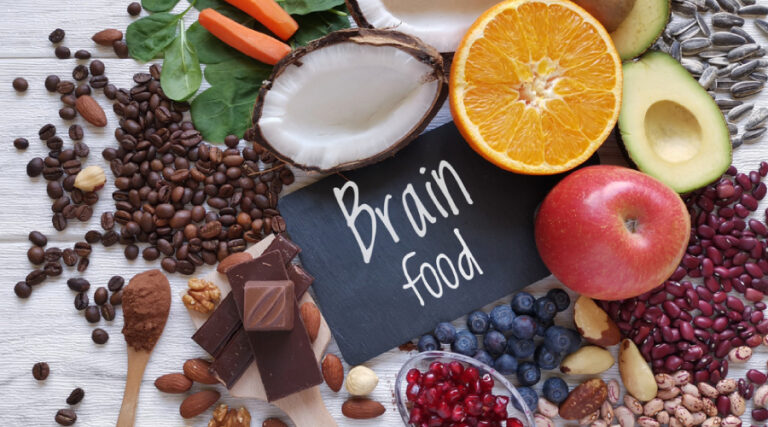In today’s fast-paced and demanding world, it’s crucial to prioritize and maintain optimal brain health. A healthy brain is fundamental for peak performance and productivity and is critical to overall well-being. It empowers us to think, stay focused, and make sound decisions. Nevertheless, stress, poor dietary choices, and a lack of physical activity can significantly impair cognitive function. The good news is that incorporating specific brain-boosting foods into our daily diet can profoundly impact our mental acuity and overall brain health. The following article will explore the top 11 brain-boosting foods that can supercharge your mind and help you achieve your full potential. Discover the top brain foods to improve memory, focus, and cognitive function. Boost your brain power with these foods!
Berries

Berries are packed with antioxidants, vitamins, and minerals, making them nature’s superheroes. Studies have shown that these small fruits can enhance cognitive function, promote heart health, and decrease inflammation. Whether blueberries, strawberries, raspberries, or cranberries, including berries in your daily diet can significantly improve overall well-being. You can enjoy them as a snack, mix them into oatmeal or yogurt, or blend them into a delicious smoothie.
Health Benefits of Berries:
– High in Antioxidants: Berries contain powerful antioxidants, reducing inflammation and oxidative stress.
– Brain Health: Berries supports cognitive function, memory, and mood.
– Heart Health: Berries lower blood pressure, cholesterol, and the risk of cardiovascular disease.
– Anti-Cancer Properties: Berries contain anthocyanins, which inhibit cancer cell growth.
– Immune System: Berries boost immune function, reducing illness and infection.
Types of Berries:
– Blueberries
– Strawberries
– Raspberries
– Cranberries
– Goji Berries
– Acai Berries
– Elderberries
– Bilberries
Nutritional Profile (per 100g):
– Blueberries: 57 calories, 2g protein, 11g carbs, 2g fiber
– Strawberries: 32 calories, 1g protein, 7g carbs, 2g fiber
– Raspberries: 64 calories, 2g protein, 15g carbs, 6g fiber
Whole Grains

Whole grains are the cornerstone of a nutritious diet, offering long-lasting energy, fiber, and vital nutrients. Unlike refined grains, whole grains preserve their nutritional value by containing the bran, germ, and endosperm. Choosing whole-grain bread, brown rice, quinoa, and whole-wheat pasta can help lower the risk of chronic diseases, support digestive health, and aid in weight management.
Health Benefits of Whole Grains:
– Reduces Chronic Diseases: Whole grains lower the risk of heart disease, diabetes, and certain cancers.
– Promotes Digestive Health: High fiber content supports healthy gut bacteria.
– Supports Weight Management: Whole grains keep you fuller, aiding weight loss.
– Improves Blood Sugar Control: Slower digestion regulates blood sugar levels.
– Boosts Energy: Complex carbohydrates provide sustained energy.
Types of Whole Grains:
– Brown Rice
– Quinoa
– Whole Wheat
– Oats
– Barley
– Rye
– Buckwheat
– Millet
Nutritional Profile (per 100g):
– Brown Rice: 110 calories, 2g protein, 25g carbs, 3g fiber
– Quinoa: 120 calories, 4g protein, 21g carbs, 5g fiber
– Whole Wheat: 130 calories, 3g protein, 27g carbs, 4g fiber
Green Leafy Vegetables
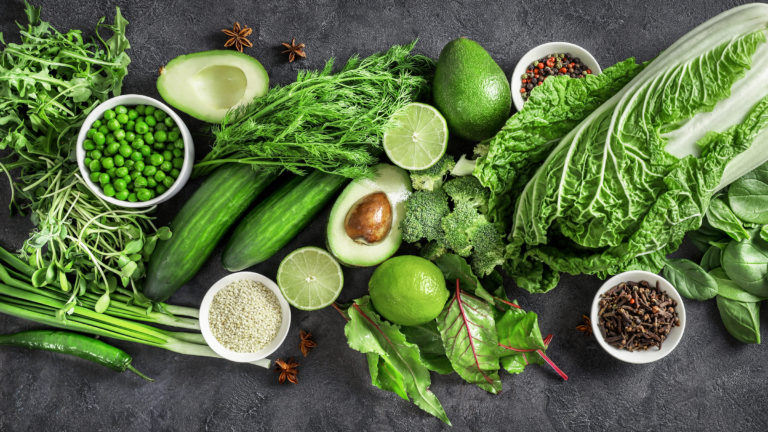
Leafy vegetables are considered superfoods because they are rich in vitamins A, C, and K and essential minerals like calcium and iron. Spinach, kale, collard greens, and Swiss chard contribute to eye health, brain function, and bone health while lowering the risk of chronic diseases. You can incorporate them into salads, blend them into smoothies, or sauté them with garlic for a nutritious and tasty side dish.
Health Benefits of Green Leafy Vegetables:
– Rich in Antioxidants: Protects against cell damage and inflammation.
– Anti-Cancer Properties: Reduces the risk of colon, breast, and prostate cancers.
– Supports Eye Health: Lutein and zeaxanthin reduce macular degeneration risk.
– Boosts Brain Function: Folate and vitamin B6 improve cognitive function.
– Supports Bone Health: Calcium and vitamin K promote strong bones.
Types of Green Leafy Vegetables:
– Spinach
– Kale
– Collard Greens
– Swiss Chard
– Arugula
– Watercress
– Bok Choy
– Mustard Greens
Nutritional Profile (per 100g):
– Spinach: 23 calories, 3g protein, 3g carbs, 2g fiber
– Kale: 50 calories, 4g protein, 5g carbs, 5g fiber
– Collard Greens: 32 calories, 3g protein, 5g carbs, 4g fiber
Nuts and Seeds
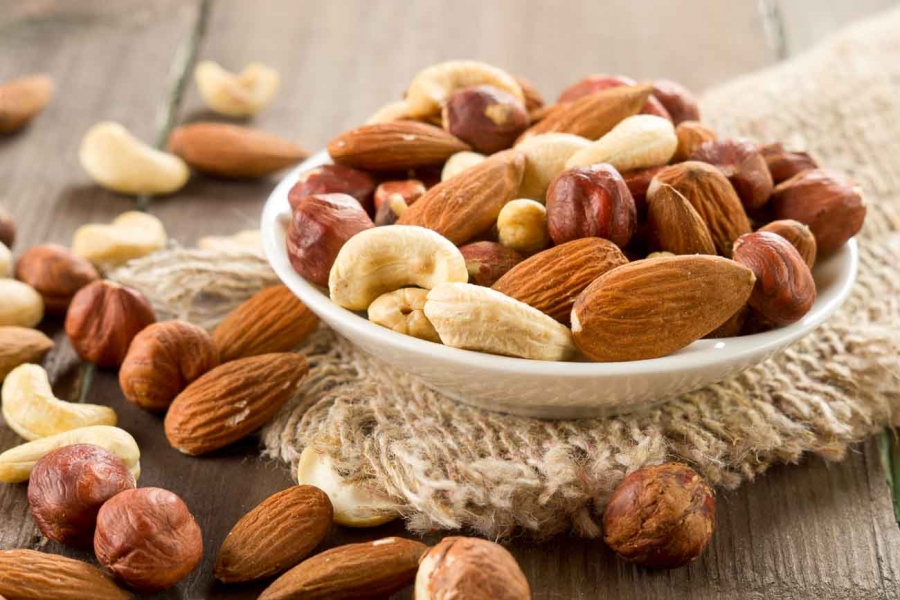
Nuts and seeds are crunchy, nutritious powerhouses high in healthy fats, protein, and fiber. Almonds, walnuts, chia seeds, and flaxseeds promote heart health, cognitive function, and weight management while providing essential vitamins and minerals. You can enjoy them as a snack, mix them into oatmeal or yogurt, or use them as a topping for salads and smoothie bowls.
Health Benefits of Nuts and Seeds:
– Brain Health: Omega-3-rich nuts support cognitive function.
– Heart Health: Monounsaturated fats lower cholesterol.
– Anti-Inflammatory: Antioxidants reduce inflammation.
– Weight Management: High fiber and protein content aids weight loss.
– Cancer Prevention: Antioxidants and phytochemicals reduce cancer risk.
Types of Nuts:
– Almonds
– Walnuts
– Pecans
– Brazil Nuts
– Cashews
– Pistachios
– Hazelnuts
– Macadamia Nuts
Types of Seeds:
– Chia Seeds
– Flaxseeds
– Hemp Seeds
– Pumpkin Seeds
– Sunflower Seeds
– Sesame Seeds
– Poppy Seeds
– Coriander Seeds
Nutritional Profile (per 100g):
– Almonds: 575 calories, 21g protein, 21g carbs, 12g fiber
– Chia Seeds: 378 calories, 16g protein, 42g carbs, 34g fiber
Avocados

Avocados are a nutrient-rich superfood, boasting an impressive profile of healthy fats, fiber, and essential vitamins and minerals. This creamy fruit supports heart health, digestive function, and weight management. Its antioxidants and phytochemicals may reduce cancer risk. You can enjoy avocados in guacamole, salads, smoothies, or as a delicious toast topping.
Health Benefits of Avocados:
– Rich in Healthy Fats: Monounsaturated fats support heart health.
– High in Fiber: Promotes digestive health and satiety.
– Antioxidant-Rich: Protects against cell damage and inflammation.
– Supports Eye Health: Lutein and zeaxanthin reduce macular degeneration risk.
– May Reduce Cancer Risk: Antioxidants and phytochemicals.
Nutritional Profile (per 100g):
– Calories: 160
– Protein: 3g
– Fat: 14g
– Carbohydrates: 8g
– Fiber: 7g
Dark Chocolate

Indulge in the rich benefits of dark chocolate, packed with antioxidants, flavonoids, and mood-boosting compounds. Dark chocolate supports heart health, cognitive function, and weight management. Its phenylethylamine and anandamide content promote feelings of happiness. Choose 70% cocoa or higher for optimal benefits.
Health Benefits of Dark Chocolate:
– Antioxidant-Rich: Dark chocolate contains flavonoids, which reduce oxidative stress.
– Heart Health: Dark chocolate lowers blood pressure and improves blood flow.
– Brain Function: Dark chocolate improves cognitive function and mood.
– Anti-Inflammatory: Dark chocolate reduces inflammation.
– Weight Management: Dark chocolate suppresses appetite.
Benefits of Dark Chocolate Compounds:
– Flavonoids: Antioxidant and anti-inflammatory properties.
– Phenylethylamine: Mood booster and natural antidepressant.
– Anandamide: Neurotransmitter that regulates mood and appetite.
Types of Dark Chocolate:
– 70% Cocoa: Minimum for health benefits.
– 85% Cocoa: Optimal for antioxidant content.
– 99% Cocoa: Highest antioxidant content.
Coffee

Coffee is more than just a morning pick-me-up—it’s a health-boosting beverage. Thanks to its antioxidants and caffeine, moderate coffee consumption supports cognitive function, physical performance, and cardiovascular health. Enjoy 2-3 cups daily to reap the benefits while minimizing potential risks.
Health Benefits of Coffee:
– Cognitive Function: Caffeine improves alertness and focus.
– Physical Performance: Caffeine enhances endurance and strength.
– Neuroprotection: Antioxidants reduce Parkinson’s and Alzheimer’s risk.
– Cardiovascular Health: Moderate coffee consumption lowers stroke risk.
– Liver Health: Caffeine reduces liver disease risk.
Coffee Nutrition Facts (per 8 oz cup):
– Calories: 0-2
– Caffeine: 95-200mg
– Antioxidants: Polyphenols and hydrocinnamic acids
Oranges
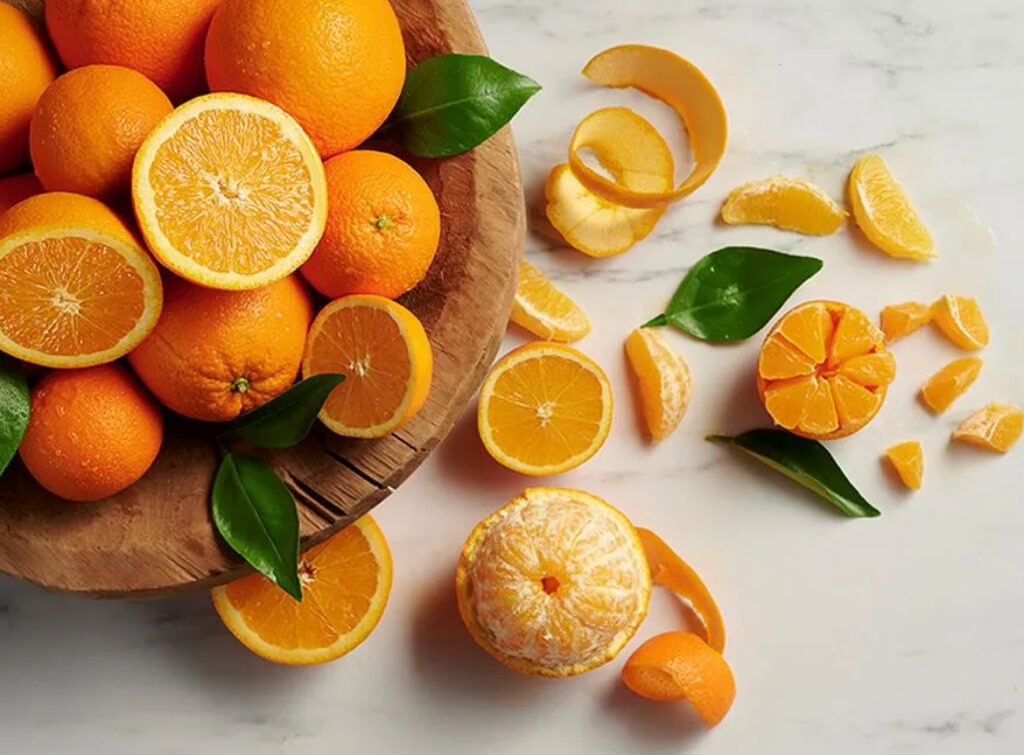
Oranges are a vibrant and nutritious fruit with vitamin C, antioxidants, and fiber. This immune-boosting superfood supports heart health, digestive function, and cancer prevention. You can enjoy oranges fresh, juiced, or in marmalade form, and explore the numerous varieties – from Navels to Blood Oranges – for a flavorful and healthy snack.
Health Benefits of Oranges:
– High in Vitamin C: Boosts immune system and fights off infections.
– Antioxidant-Rich: Protects against cell damage and inflammation.
– Anti-Cancer Properties: Flavonoids reduce cancer risk.
– Heart Health: Potassium lowers blood pressure.
– Digestive Health: Fiber supports healthy gut bacteria.
Types of Oranges:
– Navels
– Valencias
– Blood Oranges
– Cara Cara
– Mandarins
Nutritional Profile (per 100g):
– Calories: 47
– Protein: 0.9g
– Fat: 0.2g
– Carbohydrates: 12g
– Fiber: 2.9g
– Vitamin C: 53mg (89% DV)
Broccoli
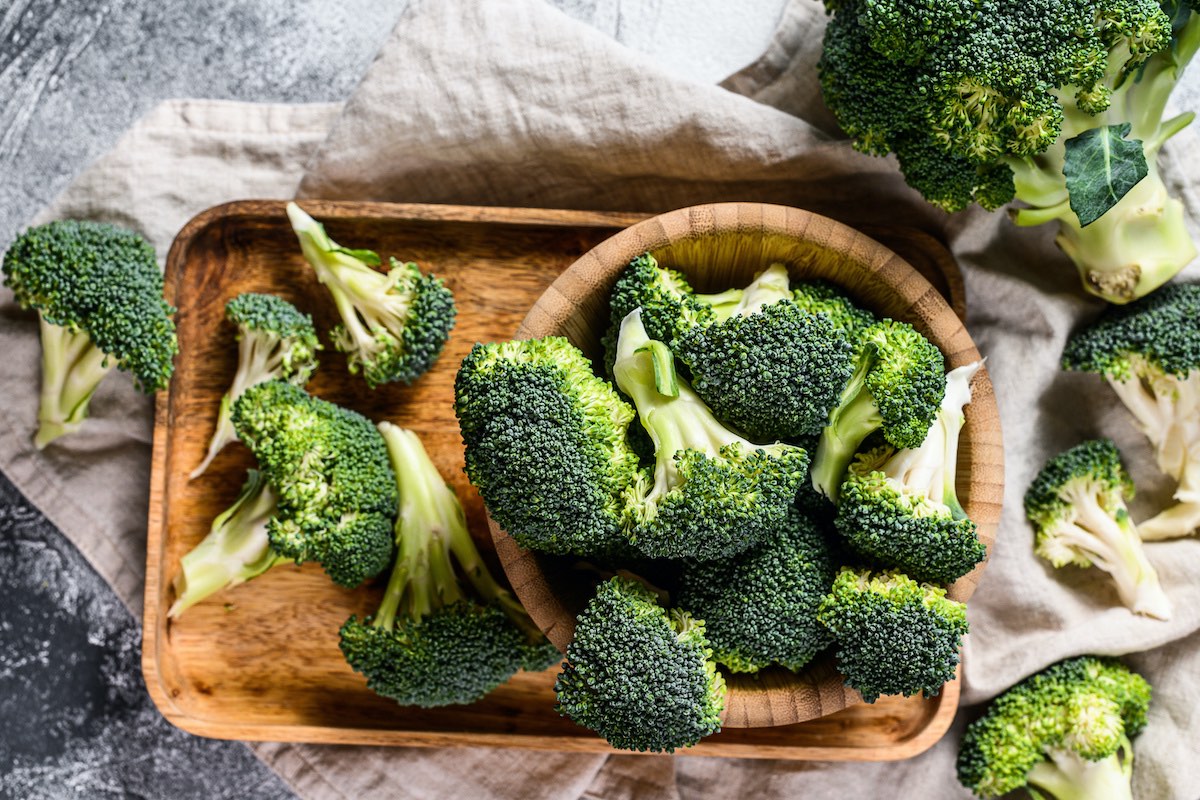
Broccoli is a nutrient-dense superfood, rich in vitamins C and K, fiber, and antioxidants. This cruciferous vegetable supports cancer prevention, heart health, and digestive well-being. With its impressive nutritional profile and versatility in cooking, broccoli is an excellent addition to a healthy diet. Enjoy it steamed, roasted, or sautéed.
Health Benefits of Broccoli:
– Cancer Prevention: Rich in antioxidants, fiber, and phytochemicals.
– Anti-Inflammatory: Reduces inflammation and supports immune function.
– Heart Health: Lowers cholesterol and blood pressure.
– Digestive Health: High fiber content supports healthy gut bacteria.
– Brain Function: Rich in vitamin K, it supports cognitive function.
Types of Broccoli:
– Calabrese
– Sprouting Broccoli
– Romanesco
– Broccolini
– Purple Broccoli
Nutritional Profile (per 100g):
– Calories: 34
– Protein: 2.5g
– Fat: 0.4g
– Carbohydrates: 6.6g
– Fiber: 2.6g
– Vitamin C: 100mg (167% DV)
– Vitamin K: 116mcg (145% DV)
Quinoa

Quinoa is a complete protein and gluten-free grain with an impressive nutritional profile. Rich in iron, magnesium, and fiber, it supports muscle growth, digestive health, and energy production. With its mild flavor and versatility, quinoa is an excellent base for salads, stir-fries, and breakfast bowls.
Health Benefits of Quinoa:
– High in Protein: Complete amino acid profile supports muscle growth.
– Gluten-Free: Ideal for those with gluten intolerance or celiac disease.
– Rich in Fiber: Supports digestive health and satiety.
– Antioxidant-Rich: Protects against oxidative stress and inflammation.
– Mineral-Rich: Good source of iron, magnesium, potassium.
Types of Quinoa:
– White Quinoa
– Red Quinoa
– Black Quinoa
– Tri-Color Quinoa
– Sprouted Quinoa
Nutritional Profile (per 100g):
– Calories: 120
– Protein: 4g
– Fat: 2g
– Carbohydrates: 21g
– Fiber: 5g
– Iron: 2.8mg (15% DV)
– Magnesium: 70mg (18% DV)
Red Cabbage
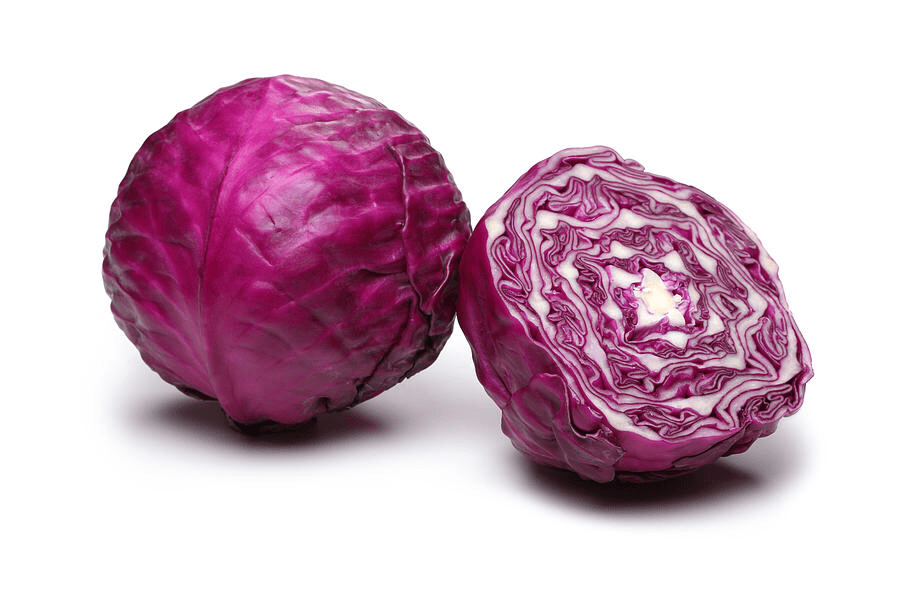
Red cabbage is a vibrant, nutrient-rich vegetable packed with antioxidants, vitamins C and K, and fiber. Its anti-inflammatory properties support heart health, digestive well-being, and cancer prevention. Add red cabbage to salads, slaws, or stir-fries for flavor and nutrition.
Health Benefits of Red Cabbage:
– Rich in Antioxidants: Protects against cell damage and inflammation.
– Anti-Cancer Properties: Contains anthocyanins and sulforaphane.
– Supports Heart Health: Lowers cholesterol and blood pressure.
– Digestive Health: High fiber content supports gut bacteria.
– Brain Function: Rich in vitamin K, it supports cognitive function.
Types of Red Cabbage:
– Deep Purple
– Red Dutch
– Ruby Ball
– Red Acre
– Savoy King
Nutritional Profile (per 100g):
– Calories: 28
– Protein: 1.8g
– Fat: 0.1g
– Carbohydrates: 6.9g
– Fiber: 2.5g
– Vitamin C: 50mg (83% DV)
– Vitamin K: 76mcg (95% DV)
Conclusion
In conclusion, integrating these 5 remarkable brain-boosting foods into your daily diet can significantly support optimal cognitive function, enhance memory, and achieve heightened mental clarity. Remember that a healthy brain is the cornerstone of a happy and productive life. Combine these nutrient-rich foods with regular exercise, sufficient sleep, and effective stress management techniques to unlock your full cognitive potential. Take charge of your brain health today and experience the benefits of a sharper, more focused mind. Unlock your mental potential! Explore the best foods for brain health, from omega-rich fish to antioxidant-packed berries. Brain Foods for Optimal Performance!

